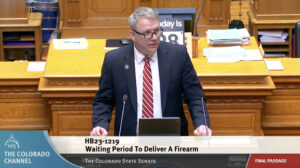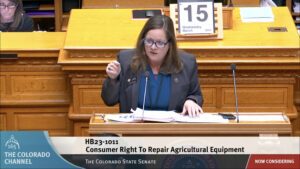Given the choice between significant or lighter limits on metropolitan districts where most of the state’s new homes are being constructed, Colorado legislators have made their choice to go with less regulation in order to get more houses built.
Now the question is whether Gov. Jared Polis, who is pushing increased construction as a solution to the state’s affordability crisis, will agree.
The Senate Local Government and Housing Committee on Tuesday rejected on a 4-3 bipartisan vote a proposal that would have barred metro-district directors from purchasing debt issued by the district. While sponsors of House Bill 1190 said it was a way to stop conflicts of interest, opponents noted that developers, who typically sit on district boards at their advent, must purchase portions of a metro district’s debt that bond buyers don’t want or else face the prospect of not getting paid for infrastructure they install in the district.
Need for metro districts
The decision came five days after the House approved a bipartisan measure, Senate Bill 110, that requires more transparency and accountability from metropolitan districts but does not limit the purchase of debt by developers or district board members. That bill is sitting on Gov. Jared Polis’ desk, and he must decide whether to sign it by the end of next week.
This focus on metro districts — locally approved special districts that build both homes and infrastructure ranging from streets to recreation centers and then sell bonds to recoup their investment — comes as a greater percentage of new construction lies within such districts.
Where there were 200 metro districts in Colorado 20 years ago, there are now 2,300, said Sen. Robert Rodriguez, the Denver Democrat who co-sponsored HB 1090. And Kyle Thomas, a bond underwriter with D.A. Davidson, estimated that metro districts have financed $10 billion in Colorado infrastructure since 2018.
Yet, complaints about these districts have increased too, with some homebuyers saying they were shocked to find that they purchased within a metro district where they are required to pay substantial mill levies to fund infrastructure and pay off debt for decades. Critics, including HB 1190 supporters, said that developers who purchase some of the debt essentially are getting rich off the interest on the bond repayments from people who already bought their homes.

Colorado state Sen. Chris Kolker speaks about a bill on the Senate floor this week.
“Our bill here is to make sure that those people who are issuing that debt, who are on that board, are not profiting from that debt,” co-sponsoring Sen. Chris Kolker, D-Centennial, said.
Developers’ actions
Developers and metro-district advocates warned, however, that eliminating that avenue for repayment of investment would stop a good number of developers from creating new homes and new metro districts. Thomas noted bond markets won’t always offer full funding for the cost of infrastructure, so developers will advance that money and then purchase the debt to have enough financing for infrastructure — financing important enough that they may forego development without it.
Such developer-held debt — and the debt issued for metro districts in general — also helps keep down the price of housing, as developers can spread out repayment of that cost across many years with bonds rather than expect it right away, metro-district proponents testified. Publicly sold debt that is double-tax-exempt can cut borrowing interest rates from 10% to 15% down to rates of 5% to 7%, allowing lower sale prices at a time when Colorado home prices are rising significantly, said Kevin Walker, a Colorado Springs developer representing the Colorado Association of Home Builders.
“Our developer and builder members have been told multiple times that growth must pay its own way, and metro districts are how it pays its own way,” Walker said during Tuesday’s hearing. “Without this tool, houses will be more expensive at a time when housing attainability is becoming more of a challenge.”
Votes crossing aisles
HB 1090 had run into some bipartisan opposition in the House, passing by a 38-24 vote when seven Democrats joined with every Republican except for Rep. Stephanie Luck of Penrose to oppose it. On Tuesday, Democratic Sen. Dylan Roberts of Avon joined with the three Republicans on the Senate Local Government and Housing Committee to defeat it.
What lays before Polis now is SB 110, which cleared the House Thursday on a 40-24 vote in which 18 of the chamber’s 19 Republicans (again excluding Luck) teamed with 22 of the chamber’s 46 Democrats to push it across the finish line. What that bill offers, explained Metro District Education Coalition Executive Director Kristi Pollard during its Feb. 14 hearing before the same Senate committee that killed HB 1190, is “a precise solution to addressing concerns … while acknowledging the tool is necessary for continued development across the state.”
Sponsored by Democratic Sens. Janice Marchman of Loveland and Rachel Zenzinger of Arvada, SB 110, which is supported by business organizations such as the Colorado Chamber of Commerce, proposes four major steps to boost metro-district transparency while increasing communications between district leaders and residents. It limits the debt districts can issue to an amount determined by the city or county in which the district lies, requires district boards to hold annual in-person town-hall meetings with residents, requires debt held by a board director be at an interest rate that is at or below market rates and requires sellers of homes in the district to provide buyers information on the district.

Colorado state Sen. Janice Marchman speaks to a bill in the Colorado Senate in March 2023.
In essence, what the bill does is accept that at a time when local governments are too cash-strapped to fund new infrastructure — or don’t want to put new development’s financial burden on existing residents — metro districts are needed to meet the state’s housing shortage. National housing-equity group Up for Growth ranked Colorado recently as the having the seventh-greatest underdevelopment among states, lacking about 127,000 units that are needed now, Pollard noted during her testimony on SB 110.
A further regulation of metro districts
“If the cities would step and pay for this work, the developer wouldn’t have to,” Mark Witkiewicz, a principal at Westside Investment Partners, whose projects include the redevelopment of the Loretto Heights campus in southwest Denver, said in opposing HB 1190. “But if the developer isn’t paying for that risk, who is?”
SB 110 follows a 2021 bill, also sponsored by Zenzinger, that put in an initial round of guardrails around metro districts, including required audits, increased notifications to district residents about their ability to run for district boards and disclosures to home purchasers about their property-tax burdens. If Polis signs the bill as expected, it’s likely that the presence of such districts only will grow as policy leaders push for further development, particularly around highly trafficked corridors, as one antidote to the rising costs of housing prices.
“I believe it’s important as policymakers that we’re precise in the measures we enact so that we don’t create unintended consequences — in this case, making it challenging for homes to be built and aggravating our housing challenges,” Marchman said.
